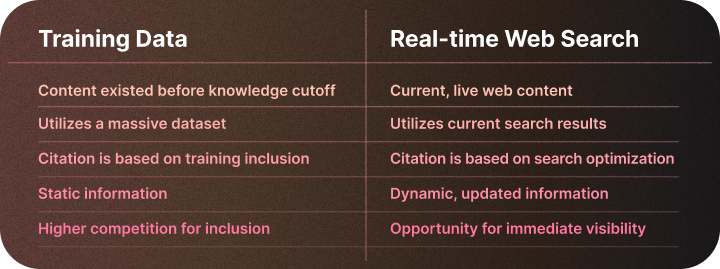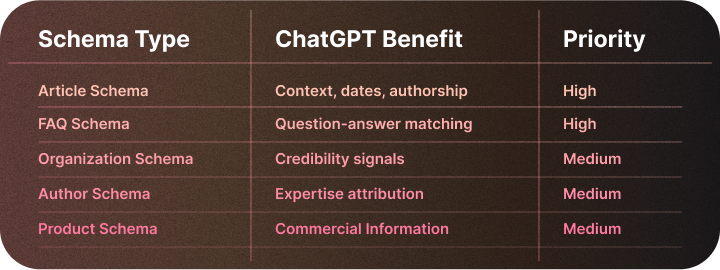SEO for ChatGPT: The Complete 2026 Guide
With ChatGPT processing over 1 billion queries monthly, ranking in AI search tools is quickly becoming a necessity for businesses to stay competitive.
Unlike traditional SEO, “ranking” in ChatGPT is a more comprehensive process of getting content referenced, cited, and presented as a trusted source. This guide offers nuanced insights into this process, along with practical advice on how to leverage it to optimize your content’s ranking.
Key Takeaways
- ChatGPT uses both old training data and live web searches to find content.
- ChatGPT values expertise and credibility over backlinks and domain authority.
- Deep, comprehensive content gets cited more than shallow articles.
- Basic technical SEO helps ChatGPT find and read your content.
How ChatGPT Actually Finds and Uses Information
Here’s where most guides get it completely wrong. ChatGPT doesn’t constantly search the web for every query. It has two distinct modes of operation that determine whether your content gets discovered.
First, ChatGPT draws from its training data, a massive body of text from across the internet, frozen at its knowledge cutoff date. This training data includes websites, articles, books, and other text sources that were crawled before the model was trained.
Second, ChatGPT can perform real-time web searches when it determines that current information is needed. This happens when users ask about recent events, request up-to-date data, or when ChatGPT recognizes that its training data might be insufficient.

The web search functionality uses Bing’s search infrastructure, but ChatGPT applies its own filtering and evaluation criteria when selecting sources. It doesn’t just grab the top Bing results; it evaluates content quality, relevance, and credibility before incorporating information into responses.
Source Selection Process
ChatGPT’s source selection follows a hierarchy that prioritizes certain types of content over others. The model evaluates several factors simultaneously when choosing which sources to cite:
- Content depth and comprehensiveness – Detailed coverage beats surface-level information
- Author and publication credibility – Established authorities get preference
- Information accuracy and consistency – Cross-verified facts rank higher
- Relevance to specific queries – Perfect matches outrank tangentially related content
- Source type hierarchy – Primary sources typically outrank secondary aggregation
Interestingly, ChatGPT shows a strong preference for educational and institutional sources when available. Government websites, academic papers, established news organizations, and industry-leading publications consistently appear in citations more frequently than blog posts or promotional content.
Citation Behavior
On a similar note, ChatGPT’s citation patterns reveal a lot about its preferences. It tends to cite sources that provide specific, factual information rather than opinion pieces. Statistical data, research findings, and expert quotes get referenced more frequently than general commentary.
The model also shows a preference for sources that clearly attribute their own information. Content that cites original research or provides clear source attribution tends to get cited more often than unsourced claims.
The ChatGPT Content Evaluation Framework
ChatGPT evaluates authority differently than traditional search. While backlinks matter for web search discovery, ChatGPT pays more attention to content-based authority signals:
- Expertise demonstration through detailed, accurate information
- Industry-specific terminology used correctly and naturally
- Institutional affiliation with established organizations
- Source attribution within your own content
- Consistent quality across your content library
- Recognition by other authoritative sources in your field
The model also recognizes institutional authority. Content from established organizations, industry associations, academic institutions, and government agencies receives higher credibility scores than individual blog posts or promotional content.
Citation of credible sources within your content signals authority to ChatGPT. When your content references other authoritative sources and provides proper attribution, it suggests you’re operating within legitimate information ecosystems rather than creating isolated content.
Content Quality Indicators
Depth matters enormously for ChatGPT optimization. Surface-level content that barely scratches a topic rarely gets cited. The model strongly favors comprehensive coverage that addresses multiple aspects of a topic.
Accuracy is non-negotiable. ChatGPT has mechanisms for detecting and avoiding inaccurate information. Content with factual errors, outdated data, or misleading claims gets deprioritized even if it’s otherwise well-optimized.
Logical structure and clear organization help ChatGPT extract relevant information efficiently. Content that uses proper headings, clear transitions, and logical information hierarchy gets processed more effectively than poorly structured material.
Completeness of coverage influences citation frequency. Content that answers related questions, addresses common objections, and provides context beyond the immediate topic tends to get referenced more often.
Recency and Freshness
Like many AI tools, ChatGPT’s approach to content freshness is more nuanced than traditional search engine optimization. For topics where information doesn’t change rapidly, older but authoritative content can outrank newer but less comprehensive material. However, publishing fresh content and keeping information current is crucial to improve the likelihood of being cited by ChatGPT, as it values up-to-date and relevant sources.
However, for rapidly evolving topics, technology trends, current events, and regulatory changes, ChatGPT strongly prioritizes recent information. The model can recognize when topics require current data and will favor sources with recent publication dates.
Regular content updates matter, but not just for freshness signals. Updated content that maintains accuracy while adding new information, examples, or insights demonstrates ongoing expertise and commitment to quality. Implementing content recency strategies, such as updating statistics and incorporating recent examples, helps maintain relevance for AI-powered searches.
Source Credibility Assessment
ChatGPT evaluates source credibility through multiple lenses. Publication credibility, author expertise, content consistency, and information verification all factor into credibility assessment.
The model can distinguish between content from established, credible publications and unknown sources. It also evaluates author bylines and can associate content with known experts in specific fields.
Cross-source verification plays a huge role. Information that appears consistently across multiple credible sources gets higher credibility scores than claims that appear in isolation.
Topical Expertise Recognition
Building topical expertise requires consistent, high-quality content creation over time. ChatGPT can recognize when sources consistently provide valuable information on specific topics.
Depth of coverage within topic areas matters more than breadth across unrelated subjects. Websites that demonstrate deep expertise in specific domains tend to get cited more frequently within those areas than generalist sites.
The model also recognizes expertise through content sophistication. Technical accuracy, proper use of industry terminology, and demonstration of insider knowledge all contribute to expertise recognition.
Technical SEO for ChatGPT Discovery
Your content needs to be technically accessible before ChatGPT can consider it. This starts with fundamental requirements that ensure discoverability:
- Clean URL structures that are easily crawlable
- Proper internal linking connecting related content
- XML sitemaps listing your important pages
- Accessible robots.txt allowing crawling of key content
- Server-side rendering for JavaScript-heavy sites
- Consistent uptime and fast server response times
JavaScript-heavy sites need special attention. If your content requires JavaScript execution to render, it may not be accessible to ChatGPT’s crawling systems. Server-side rendering or proper prerendering ensures content availability.
Content Structure Optimization
Header hierarchy matters significantly for ChatGPT optimization. Proper H1, H2, and H3 usage helps the model understand your content structure and extract relevant information efficiently. To optimize content structure, use well-organized headings and a clear hierarchy, which improves both human readability and ChatGPT’s ability to extract key details.
Clear section breaks and logical information organization make it easier for ChatGPT to identify specific pieces of information relevant to particular queries. Well-structured content gets cited more frequently than poorly organized material.
Use descriptive headings that clearly indicate what information follows. Generic headings like “Overview” or “Introduction” are less helpful than specific, descriptive headings that summarize the content.
Lists, tables, and other structured content formats work particularly well for ChatGPT extraction. Information presented in these formats gets referenced more frequently than dense paragraph text. Additionally, using bullet points to break down complex topics improves skimmability and makes key information more accessible for both readers and AI.
As part of optimizing content structure, remember to craft effective meta descriptions that incorporate relevant keywords. Well-written meta descriptions can enhance search engine visibility and improve click-through rates.
Schema Markup That Matters
Not all schema markup influences ChatGPT, but certain types provide clear benefits. The most valuable schema types for ChatGPT optimization include:

FAQ schema can be particularly valuable since ChatGPT often deals with question-answering scenarios. Properly marked up FAQ content increases the likelihood of being cited in response to related queries.
Page Performance
Page load speed affects ChatGPT’s ability to access your content during real-time searches. Slow-loading pages may not be fully processed or may be skipped entirely in favor of faster alternatives.
Server reliability is crucial. If your pages frequently return errors or time out, they won’t be available when ChatGPT attempts to access them. Consistent uptime is essential for maintaining visibility.
Content delivery networks (CDNs) can improve accessibility by reducing load times and increasing reliability across different geographic regions where ChatGPT’s systems might be accessing your content.
Mobile and Multi-device Optimization
ChatGPT’s web browsing capabilities include mobile user agents, so your content needs to be accessible and well-formatted across device types.
Responsive design ensures your content displays properly regardless of how ChatGPT accesses it. Mobile-unfriendly sites may have their content improperly parsed or ignored entirely.
Touch-friendly interfaces and mobile-optimized navigation don’t directly affect ChatGPT, but they influence overall site quality signals that can impact how your content gets evaluated.
Content Strategy for ChatGPT Visibility
Shallow content rarely gets cited by ChatGPT. The model strongly favors comprehensive coverage that addresses topics thoroughly rather than providing surface-level information.
This doesn’t mean longer is always better—it means complete is better than incomplete. Cover the essential aspects of your topic, address common questions, and provide the level of detail someone would need to truly understand the subject.
Include examples, case studies, and specific details that demonstrate practical application of concepts. Abstract information gets cited less frequently than concrete, actionable insights.
Address counterarguments and alternative perspectives within your content. Balanced coverage that acknowledges different viewpoints tends to get cited more often than one-sided presentations.
Question-Based Content Architecture
Structure your content around the questions your audience actually asks. ChatGPT often deals with specific queries, so content that directly answers those questions has a higher chance of being cited.
Use tools like Answer the Public, Google’s “People also ask” feature, and industry forums to identify the actual questions people have about your topics. Build content sections that directly address these questions.
Create comprehensive FAQ sections that go beyond basic questions. Address complex, nuanced questions that demonstrate deep understanding of your subject matter.
Consider the follow-up questions users might ask after getting initial answers. Content that addresses the natural progression of inquiry tends to get cited more frequently.
Primary Source Development
Becoming a primary source dramatically increases your chances of being cited by ChatGPT. Original research, proprietary data, and firsthand insights carry much more weight than aggregated information from other sources.
The most effective primary source content includes:
- Original surveys and studies that provide new industry insights
- Proprietary data analysis that reveals unique trends or patterns
- Case studies from your own experience documenting real results
- Expert interviews with recognized thought leaders
- First-hand testing and experimentation with documented methodologies
- Industry reports based on your unique market position
Document your own experiments, case studies, and results. Primary source content about your own experiences and outcomes provides the type of specific, credible information ChatGPT values.
Multi-angle Topic Coverage
Cover your core topics from multiple angles and perspectives. Different users approach the same topics with different backgrounds, needs, and contexts.
Create beginner guides alongside advanced tutorials. Address the same concepts from different skill levels to capture a broader range of queries.
Cover both theoretical and practical aspects of your topics. Some users want to understand concepts, while others need implementation guidance.
Address different use cases and scenarios within your topic area. Comprehensive coverage of various applications increases the likelihood of being cited across different queries.
Content Freshness Strategies
Maintain accuracy across your content library. Outdated information can harm your credibility and reduce citation frequency across all your content.
Update statistics, examples, and references regularly. Fresh data and current examples make your content more valuable for ChatGPT citations.
Add new sections to existing content when relevant developments occur in your field. Expanding existing content often works better than creating entirely new pages.
Create content calendars that align with keyword research, industry cycles, seasonal trends, and predictable information needs. Timely content creation increases your chances of being the current, authoritative source when topics become relevant.
Building Links for ChatGPT SEO
Link building remains a cornerstone of search engine optimization, but when it comes to ChatGPT and other AI-driven platforms, the types of links you pursue, how you acquire them, and how much “link juice” they can offer have a unique impact on your website visibility and authority.
ChatGPT, like traditional search, evaluates the quality and relevance of links pointing to your site. However, its AI systems place particular emphasis on the credibility and context of those links, especially when generating responses that cite external sources. Here’s how you can optimize your link building strategy for ChatGPT SEO:
- Authority Links: Securing links from high authority sites—such as government agencies, educational institutions, and respected industry leaders—signals to both search engines and ChatGPT that your content is trustworthy. These links can elevate your site’s authority, making it more likely to be referenced in AI-generated content and search results.
- Relevant Links: Links from websites within your niche or closely related industries help ChatGPT understand your site’s context. When your content is linked by other relevant sources, it reinforces your expertise and increases the chances of being cited in responses tailored to specific user needs.
- Internal Links: A well-structured internal linking strategy not only improves user satisfaction by guiding visitors to relevant material, but also helps ChatGPT’s crawlers and other search engine bots efficiently discover and index your content. This enhances your site’s overall SEO performance and ensures that key information is easily accessible for AI-driven searches.
- Natural Links: Earning links organically—through high-quality content creation, guest blogging, resource page inclusion, or brand mentions on other websites—demonstrates genuine authority and relevance. ChatGPT and other search engines are adept at recognizing natural link profiles, which can boost your site’s credibility and reduce the risk of being flagged as spam.
- Social Links: While links from social media platforms may not always pass traditional SEO value, they can drive significant traffic and engagement metrics. Increased user interaction and brand visibility on social channels can indirectly influence how ChatGPT and other AI tools perceive your site’s authority and relevance.
To build a robust link profile that benefits both ChatGPT and traditional search engines, leverage a combination of proven SEO tools and strategies:
- Keyword Research: Use advanced keyword research tools to find relevant keywords and content ideas that attract links from other websites. Targeting high search volume and trending topics can increase your chances of earning valuable backlinks.
- Content Creation: Focus on creating content that is not only informative and engaging but also link-worthy. Comprehensive guides, original research, and interactive elements can encourage other sites to reference your work.
- Link Building Campaigns: Implement targeted link building strategies such as guest posting, resource page outreach, and broken link building to acquire high-quality links from authoritative and relevant sources.
- Competitor Analysis: Regularly analyze your competitors’ link profiles using SEO tools to identify new opportunities for link acquisition and to benchmark your own progress.
- SEO Audits: Conduct ongoing SEO audits to ensure your site remains fully SEO optimized, with a healthy internal link structure and no technical barriers to crawling or indexing.
By prioritizing high-quality, relevant content and focusing on natural, authoritative link acquisition, you’ll not only improve your site’s ranking on ChatGPT but also strengthen your overall digital presence across all major search engines. Remember, effective link building is about building relationships and providing value—both to users and to the AI systems that power the next generation of search.
Advanced ChatGPT SEO Tactics
Consistency across your content builds trust with ChatGPT’s evaluation systems. Maintain consistent quality, accuracy, and depth across all your content rather than having a few standout pieces mixed with mediocre material.
Create content clusters around your core topics. Multiple pieces of related, high-quality content on the same subject area increases your chances of being recognized as a topical authority.
Cross-link related content within your site to help ChatGPT understand the relationships between your different pieces of content. This internal linking also helps establish your comprehensive coverage of topic areas.
Maintain consistent authorship attribution. Having recognized experts consistently associated with your content helps build authority signals over time.
Semantic Content Optimization
Think beyond individual keywords to conceptual coverage. ChatGPT understands context and relationships between concepts, so comprehensive conceptual coverage matters more than keyword density.
Use related terms, synonyms, and contextually relevant vocabulary throughout your content. This helps ChatGPT understand the full scope of topics you’re addressing.
Address related concepts and topics that provide context for your main subject. Comprehensive contextual coverage helps your content get cited for a broader range of queries.
Create content that connects different concepts and explains relationships between ideas. This type of contextual content often gets cited when ChatGPT needs to explain complex topics.
Entity-Based SEO
Focus on becoming associated with specific entities—people, companies, concepts, or topics—within your field. ChatGPT recognizes entity relationships and can associate your content with specific expertise areas.
Create comprehensive profiles and coverage of important entities in your industry. Becoming the go-to source for information about specific companies, people, or concepts increases citation frequency.
Use proper entity markup and clear entity references throughout your content. Help ChatGPT understand which entities your content covers and how they relate to each other.
Cross-Reference Optimization
Study which sources get cited alongside yours in ChatGPT responses. Understanding your “citation neighbors” helps identify opportunities for improved positioning.
Create content that complements rather than duplicates information from other authoritative sources. Filling gaps in existing coverage increases your chances of being cited alongside established authorities.
Reference and link to other high-quality sources appropriately. Demonstrating that you operate within legitimate information ecosystems rather than isolation helps build credibility.
Conversation Flow Optimization
Structure your content to match how ChatGPT presents information. Study ChatGPT responses in your field to understand common information patterns and presentation styles.
Use clear, concise language that works well for synthesis into ChatGPT responses. Overly complex or convoluted writing is less likely to be quoted directly.
Create quotable sections with clear, authoritative statements that work well as citations. These might be key insights, important statistics, or clear explanations of complex concepts.
Measuring and Tracking ChatGPT SEO Success
Set up monitoring systems to track when your brand, content, or expertise gets mentioned in ChatGPT responses. This requires a combination of manual testing and systematic monitoring approaches.
Create a list of key queries related to your expertise and regularly test them in ChatGPT to see if your content gets cited. Track changes in citation frequency over time.
Use tools like Google Alerts to monitor mentions of your brand across the web, which can help identify when your content gets referenced in articles that might later be cited by ChatGPT.
Monitor competitor citations to understand the competitive landscape and identify opportunities where you could replace or supplement competitor content in ChatGPT responses.
Query Performance Analysis
Develop a systematic approach to understanding which types of queries result in citations of your content. Key metrics to track include:
- Query categories that consistently cite your content
- Seasonal patterns in citation frequency
- Query variations that affect citation likelihood
- Competitor comparison across similar queries
- Citation context and positioning within responses
Test variations of similar queries to understand how query phrasing affects citation likelihood. Even free tools like Google Search Console can tell you most of what you need to know. Small changes in how questions are asked can dramatically change which sources get cited.
Competitive Intelligence
Analyze which sources consistently get cited alongside yours or instead of yours for key queries in your field. Understanding the competitive citation landscape helps identify improvement opportunities.
Study the content characteristics of frequently cited competitors. What makes their content more citation-worthy than yours? Use this analysis to improve your own content strategy.
Identify gaps where competitors get cited but you don’t. These represent opportunities to create better content or optimize existing content for improved visibility.
ROI Measurement
Track traffic referrals that can be attributed to ChatGPT citations. While direct attribution can be challenging, look for patterns in direct traffic, branded searches, and other indicators that might correlate with ChatGPT visibility.
Monitor changes in brand awareness and thought leadership indicators that might correlate with increased ChatGPT citations. Surveys, social media mentions, and industry recognition can provide indirect ROI measurements.
Attribution Tracking
Develop systems to track the customer journey from ChatGPT exposure to conversion. This might involve tracking branded searches, direct website visits, or other indicators that users discovered you through AI interactions.
Use UTM parameters and other tracking methods to identify traffic that might be coming from users who discovered you through ChatGPT but didn’t click directly from the platform.
Monitor changes in organic search performance for branded terms, which can indicate increased brand awareness potentially driven by ChatGPT citations.
Summary
ChatGPT SEO represents a fundamental shift in how content gets discovered and consumed. The companies that master these strategies now will establish dominant positions before the competition realizes what’s happening. Start with comprehensive, authoritative content creation, focus on becoming a trusted source in your field, and systematically track your progress. The opportunity is massive, but it won’t stay under the radar forever.
If your content isn’t being referenced or surfaced by AI tools, it’s time to rethink your approach.
Book a 30-minute consultation with Timmermann Group and we’ll identify what’s missing.
Frequently Asked Questions
Is there SEO for ChatGPT?
Yes, SEO for ChatGPT involves optimizing your content to get cited and referenced in ChatGPT’s responses. ChatGPT pulls information from both its training data and real-time web searches, making your content discoverable through proper optimization strategies.
How to optimize search for ChatGPT?
Optimize for ChatGPT by creating comprehensive, authoritative content with proper technical SEO and clear source attribution. Focus on becoming a primary source with original research and expertise rather than just copying information from other sites.
How to rank #1 in ChatGPT results AI SEO strategy?
Build topical authority through consistent, high-quality content creation and establish yourself as a trusted source in your field. “Ranking #1” in ChatGPT means getting consistently cited as an authoritative source rather than appearing at the top of a traditional search results list.
What is SEO for AI called?
SEO for AI is commonly called Generative Engine Optimization (GEO) or AI SEO. This approach focuses on optimizing content specifically for AI-powered search tools and chatbots rather than traditional search engines like Google.






